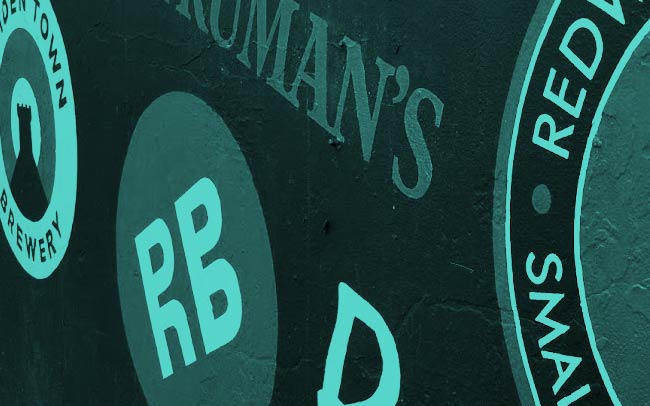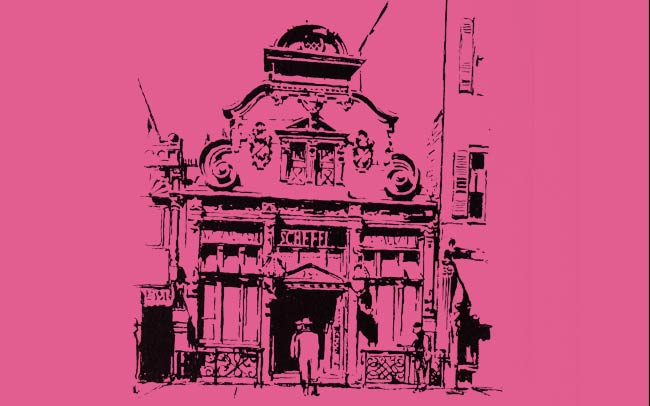Visit the Boak and Bailey's Beer Blog site
Here’s all the news and commentary on beer and pubs that grabbed our attention in the past week, from brewery numbers to Belgian postmen.
First, a bit of news that slipped out while we weren’t looking, but was picked up by our pal Darren Norbury: the All-Party Parliamentary Beer Group (APPBG) has launched an enquiry into the health and future of the UK cask ale market. Now, this sounds a bit more exciting than it actually is – the APPBG doesn’t have huge clout; it’s basically the Parliamentary branch of CAMRA. But, still, they’re calling for evidence, will be debating the issue seriously, and should at least be able to ensure this issue gets five minutes of the Prime Minister’s attention at some point. To have your say, submit written evidence to Paul Hegarty, honorary secretary of the APPBG (paul@beergroup.co.uk) before 31 March.
 Another interesting story: The Brewers’ Journal reports that there are now more than 3,000 UK breweries, according to data from UHY Hacker Young, with many opening during 2020, despite the economic impact of the pandemic. This line is especially interesting: “The firm adds that the attraction of starting a brewery business in recent years has been influenced by the continuing stream of craft breweries being purchased by multinationals.” We don’t doubt that’s true.
Another interesting story: The Brewers’ Journal reports that there are now more than 3,000 UK breweries, according to data from UHY Hacker Young, with many opening during 2020, despite the economic impact of the pandemic. This line is especially interesting: “The firm adds that the attraction of starting a brewery business in recent years has been influenced by the continuing stream of craft breweries being purchased by multinationals.” We don’t doubt that’s true.
Leeds-based brewer Mike Hampshire isn’t sure about those numbers at all, however, and cautions us not to interpret this as a sign that all is well in the world of brewing:
I expect like we saw last summer, people won’t be immediately rushing back to the pubs in numbers like we had before the pandemic, which means many publicans will opt for a “safe” and perhaps limited draught beer range. This means guest bar space for micro-breweries will be restricted for a while… In separate conversations with some of Leeds’ smaller brewery owners, they are already feeling squeezed out of bottle shops as more breweries compete for shelf space. This includes larger regional breweries who perhaps weren’t so bothered before… An interesting twist on the number of new breweries opening is that some are being run part-time, where owners and some employees have personal income from elsewhere. It’s a different kind of challenge for the full-time owners who will feel more personal financial pressure as well as the trading difficulties …My fear is, that although we have 3,000 breweries now, we will see many closures in the coming 12 months.
 For Burum Collective Ellie King expresses a certain frustration with the lazy view that ‘pubs are for everyone’ or naturally welcoming, asking ‘Whose culture is pub culture?’:
For Burum Collective Ellie King expresses a certain frustration with the lazy view that ‘pubs are for everyone’ or naturally welcoming, asking ‘Whose culture is pub culture?’:
The pub has long been considered a cornerstone of British culture… For the last year the simple pleasures of a pint have been stymied by covid as the crisis has wreaked havoc across the food and drink industry. Many of us are eagerly counting down the days until pints can be shared with loved ones, or enjoyed alone… However there are many people for whom a trip to the pub is not an enjoyable, comfortable or safe experience. Whilst I am hugely looking forward to that first pint of cask ale when pubs reopen, there are some never-to-be-forgotten anxieties I am not keen on facing again… As a woman drinking and working in pubs over the last 2 decades I have been patronised, ignored, gawked at, subjected to unsolicited physical interaction and been told to smile and wear something shorter/lower/tighter.
This is such a complicated issue and one we tried to tackle in the conclusion to our book 20th Century Pub. If what makes you feel relaxed and comfortable makes others feel on edge, and vice versa, are pubs doomed to be exclusive and excluding? Gawd, we hope not.
 For Good Beer Hunting Michael Stein has investigated the history of Culmbacher, an obscure American beer style of the 19th century deriving from, but not the same as, German Kulmbacher:
For Good Beer Hunting Michael Stein has investigated the history of Culmbacher, an obscure American beer style of the 19th century deriving from, but not the same as, German Kulmbacher:
According to source material, the original, Old World Kulmbacher was a dark beer. It had a pronounced malt flavor and a sweetish taste. For American brewers, it had Bavarian characteristics, in that it was brewed along the lines of a Bavarian Lager, with a strong starting gravity. Perhaps the greatest variation between the German original and the American adaptation is that U.S.-made Culmbacher was sometimes brewed to be a near beer—that is, high in extract and low in alcohol… But for all the ways that Culmbacher reflected the push-and-pull of German-American beer culture and identity, the style was not to last. Ultimately, the nativism and xenophobic sentiment that sprung up around World War I meant that German beer traditions began to fall out of favor.
 SOURCE: Ashley Joanna/Belgian Smaak For Belgian Smaak Ashley Joanna continues a series of brief portraits of Belgian brewers, introducing us to Mario ‘Bolle’ Jates:
SOURCE: Ashley Joanna/Belgian Smaak For Belgian Smaak Ashley Joanna continues a series of brief portraits of Belgian brewers, introducing us to Mario ‘Bolle’ Jates:
When Mario finishes his shift as a postman, he changes from his B-post attire to a collared shirt, one on which the logo “Bollecious” is embroidered on the upper left side. Bollecious is Mario’s side hustle beer business. The name comes from the nickname his friends gave him at University: Bolle. The nickname originated in the title of a song from a German band, J.B.O. – sometimes known in their home country as James Blast Orchester—the lyrics of which describe how you can turn negative situations into something positive and laugh through life even when times are tough.
 Duncan Mackay, AKA The Pubmeister, has decided to mark the 50th anniversary of CAMRA with some number-crunching with bonus boundary debates:
Duncan Mackay, AKA The Pubmeister, has decided to mark the 50th anniversary of CAMRA with some number-crunching with bonus boundary debates:
A while ago I mentioned that a crack team of analysts were mapping every pub ever to have appeared in the CAMRA Good Beer Guide… Capturing every pub ever included is harder than you might think so the final figures may still be subject to minor tweaking. Early editions were often vague about the precise location of pubs, usually a name and the briefest of description was provided. A pathological resistance to postcodes didn’t help – they were not incorporated until 2004, fully thirty years after their universal adoption… Local authority boundaries have also changed over the years so, for example, a batch of pubs placed in Berkshire in the 1974 Guide moved to Oxfordshire following enactment of Ted Heath’s local government act. The legislation also created new and largely unloved authorities such as Avon, Cleveland and Humberside that later disappeared.
Finally, from Twitter, there’s this:
For more interesting reading check out Alan McLeod’s Thursday round-up. (Is anyone else doing a round-up we should know about? A few have come and gone in the past year.)
News, nuggets and longreads 20 March 2021: Culmbacher, culture, counting originally posted at Boak & Bailey's Beer Blog
More...
Another interesting story: The Brewers’ Journal reports that there are now more than 3,000 UK breweries, according to data from UHY Hacker Young, with many opening during 2020, despite the economic impact of the pandemic. This line is especially interesting: “The firm adds that the attraction of starting a brewery business in recent years has been influenced by the continuing stream of craft breweries being purchased by multinationals.” We don’t doubt that’s true.
For Burum Collective Ellie King expresses a certain frustration with the lazy view that ‘pubs are for everyone’ or naturally welcoming, asking ‘Whose culture is pub culture?’:
For Good Beer Hunting Michael Stein has investigated the history of Culmbacher, an obscure American beer style of the 19th century deriving from, but not the same as, German Kulmbacher:
SOURCE: Ashley Joanna/Belgian Smaak For Belgian Smaak Ashley Joanna continues a series of brief portraits of Belgian brewers, introducing us to Mario ‘Bolle’ Jates:
Duncan Mackay, AKA The Pubmeister, has decided to mark the 50th anniversary of CAMRA with some number-crunching with bonus boundary debates:




 Reply With Quote
Reply With Quote